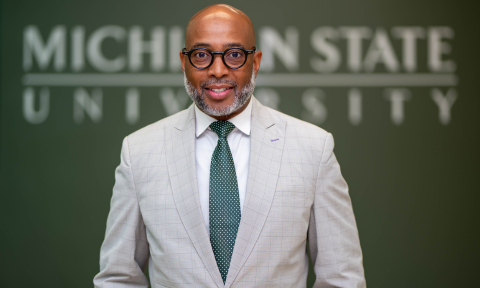Assistant Professor Jerome Graham of Michigan State University's College of Education will examine the relationship between chronic absenteeism and student well-being across Georgia with a $450,000 grant. Supported by the Center on Reinventing Public Education’s Evidence Project and funded by the Walton Family Foundation, the study will address two interrelated challenges exacerbated by the COVID-19 pandemic: worsening student well-being and rising absenteeism.

Research shows chronic absenteeism rates in Georgia K-12 schools nearly doubled between the 2018–19 and 2021–22 school years, rising to nearly 25%. The rate improved by less than 2% during the 2022-23 school year. The researchers seek to understand the impact of post-pandemic absenteeism on students and to identify and help stakeholders develop effective strategies to address the issue.
“There’s a lot of research on the drivers of absenteeism and student well-being separately, but fewer scholars have looked at whether these challenges are related, particularly since the pandemic,” said Graham.
Graham leads the research team, which includes:
- Education Policy Ph.D. students Su Yon Choi and Tiyanna Peterson,
- Richard Welsh and Daphne Penn from Vanderbilt University,
- and Monica Flamini and Shuyang Wang from the Georgia Governor’s Office of Student Achievement (GOSA)
to explore solutions that can be implemented across the state and beyond.
Three-pronged approach
"A lot of what we know about absenteeism focuses on hard-to-move drivers like transportation or poverty, but we’re looking at elements schools can directly leverage, like improving how students feel about school and addressing mental health challenges,” said Graham.
The 18-month, mixed-method project, which began in January 2025, will take a three-pronged approach to address the challenges of absenteeism.
- Linking well-being to attendance: The first focuses on how factors such as bullying, mental health challenges, suicidal thoughts and behaviors, and perceptions of school climate influence attendance rates. By analyzing data on these indicators of well-being and rates of chronic absence from before, during and after the pandemic, scholars will identify patterns and changes in absenteeism trends and their connection to well-being. They will also use demographic and achievement data to explore whether these trends look different across student subgroups.
- Learning from success: By identifying “positive outlier” schools that have successfully reduced absenteeism rates, the team will reverse-engineer strategies that can be scaled across districts. This phase will involve interviews and focus groups with school leaders, teachers and families to understand what works in different contexts. “We want to know what practices these schools are using to differentiate themselves and how they might be leading to reductions in absenteeism,” said Graham. This strand will pay particular attention to strategies educators used to address absenteeism that involved a focus on student well-being.
- Aligning policies with evidence: The team will also evaluate whether state and district policies align with evidence-based practices and the needs of families and students. Interviews with policymakers, educators and parents will inform recommendations to bridge gaps between policy and practice.
The approach is unique, but so too is the environment for the study.
GOSA, which is part of the research team, oversees Georgia's efforts to address absenteeism and improve literacy, which the General Assembly identified as key priorities in the state. The Assembly created the Georgia Council on Literacy to explore the root causes of the state's low literacy rates, and the 30-member council prioritized absenteeism as a primary issue to address.
“Georgia, therefore, offers a unique and supportive context for this study,” Graham said. “The research will provide actionable insights and create collaborative learning opportunities for state, district and school leaders to address absenteeism.”

Scaling solutions
“I hope this research can contribute to thinking about what schools can do on a day-to-day basis to enhance student well-being and the support they may need from districts or external partners in this effort,” said Choi.
“An important goal of this research is to ensure its findings lead to actionable insights for educational stakeholders seeking to address absenteeism that are relevant to and useful for districts within the state and beyond,” said Graham.
Throughout the GOSA partnership, researchers and practitioners will convene to share challenges and opportunities, collaborate through workshops and disseminate findings to policymakers and educators. Researchers from Michigan and New York will also join the conversation during a final convening to contextualize the findings for broader application.
The grant aligns with Graham’s broader research agenda of leveraging evidence-based practices and partnerships with state actors and district leaders to address educational inequities.




